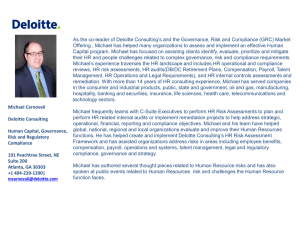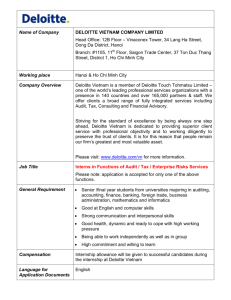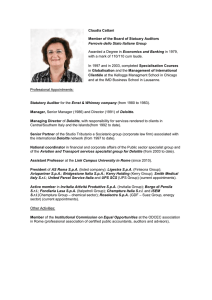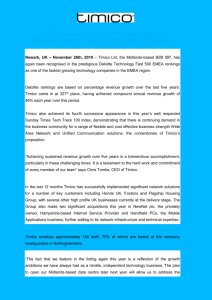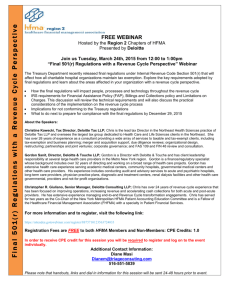Deloitte Consulting - Boston College Personal Web Server
advertisement
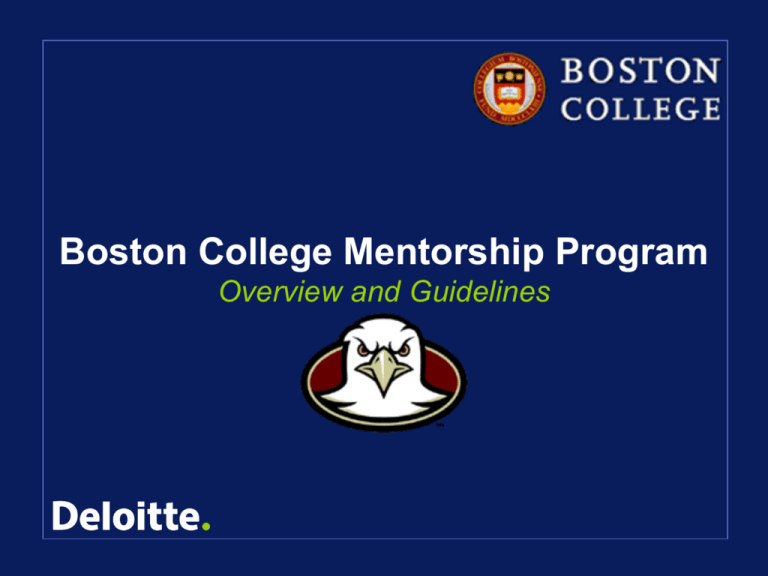
Boston College Mentorship Program Overview and Guidelines Agenda Why are we here? – – – – Introduction Key Objectives and Benefits The Assignment Timeline Who is Eagle Enterprises? – – – – – Company Overview EE as a Market Leader EE’s Strategy EE’s Values The Challenge What do you need to do to be successful? – Sample Organizational Structure – Key Lessons Learned (From Previous Semesters) Q&A Why are we here? Introduction The program was initially developed in the Fall of 2001 at Boston College. The program consists of a presentation of a business case through a series of in-class presentations to undergraduate Juniors and Seniors. The case content focuses on consulting processes, technology solutions, and CRM concepts. The students are challenged to develop a formal response to an RFI and present their findings and solution options to a panel of Senior Managers and Partners who will assess them against a variety of factors. The program is run entirely by volunteers from Deloitte. Each practitioner involved contributes many hours of their time by working with students, presenting in class, and/or organizing the logistics of the overall effort. On average, more than 25 practitioners participate each semester, making it one of the largest firm activities within the local office. Key Objectives and Benefits In addition to experiencing “real-life” case material, there are a number of additional goals each of you should seek to achieve 1. An introduction to case-style learning (i.e. team structured, openended problem solving) 2. A unique first-hand look at consulting concepts; specifically Deloitte consulting 3. An understanding of TPM concepts, technologies, and related business strategies 4. An appreciation for the role of technology implementation in achieving success on business transformation 5. An opportunity for students to develop presentation skills What is your assignment? There are two pieces to your assignment 1. Response to the RFI: – A written response to the information presented in class • Should respond to the issues raised in the RFI • Reviewed by Deloitte and the Professor as a midpoint evaluation to ensure the group understands the assignment 2. Presentation of Findings: – Create and deliver a PowerPoint presentation to present your solution to your class and evaluators • Your Role: Consultant Firm Responding to RFI • Evaluators Role: Potential Clients (Eagle Enterprises) – Elaborate on your response to the RFI – Assessed by a group of Deloitte evaluators and graded by your Professor Course Timeline The program spans approximately twelve weeks. Key Dates Class 1 (9/23) Week 1 Week 2 Week 3 Week 4 Week 5 Week 6 Week 7 Week 8 9/23 9/30 10/7 10/14 10/21 10/28 11/4 11/11 Deloitte Class 2 Presentation (9/30) Skills (10/14) Deloitte Milestone Student Milestone First Draft RFI Due (10/28) Feedback received from Deloitte (11/2) Final RFI & Presentat ion Due (11/10) Deliver Presentation (11/11) Who is Eagle Enterprises? Company Overview Eagle Enterprises is a $9.5B global consumer products manufacturer with 5 primary business segments. Blades & Razors Home Appliances Oral Care Personal Care Batteries EE as a Market Leader EE is a solid, global market leader across many of it major consumer products categories: Blades and Razors segment 71% global market share Alkaline battery operations 40% market share Male grooming #1 position worldwide Toothbrushes and oral care appliances World leader Manufacturing activities are run from 33 different locations in 15 countries. EE’s products are distributed through wholesalers, retailers and agents across more than 200 countries and territories. Every day, over one billion people around the world use one or more EE products. EE’s Strategy Managing the company with a long-term, global outlook. EE has a demonstrated ability to generate long-term, profitable growth in a changing global marketplace through several fundamental strengths – Constantly increasing scientific knowledge in core businesses – Innovative products that embody meaningful technological advances • Constantly developing new, cutting-edge products. • Introduce roughly 20 new products annually. – Immense manufacturing capability that produces billions of flawless products every year — reliably, efficiently and cost-effectively EE’s Values EE’s work environment and operations are defined by 3 core values: Achievement Integrity Collaboration EE is committed to the highest standards of achievement in all areas of the company. They constantly challenge themselves to exceed expectations of both internal and external customers. Ethical behavior and mutual respect are the foundations for relationships at EE. This integrity is shared with customers, colleagues and the wider community. EE works together closely as one global team to improve the business each and every day. The employees at EE communicate openly and establish clear accountability for making decisions, identifying issues and solutions, and maximizing business opportunities. The Challenge A comprehensive revised trade approach is necessary to realizing this EE’s long-term objectives: 1.To automate and improve the current process, transferring accountability and control to individual account managers. 2.To eliminate the current system of paper-based authorization, Excel spreadsheets, word of mouth, and e-mails. 3.To provide field sales reps with an adequate tool to streamline forecasting, planning, authorization, and payment processes. 4.To effectively manage and substantiate trade spend and investment across categories, customers, and buyers. What do you need to do to be successful? Sample Organizational Structure The case study program requires participation across a variety of roles. Senior Sponsor/Advisor Case Study Leadership Council RFI Graders Coaches Professor Final Presentation Logistics/Grading Class Presenters eRoom Coordinator KEY Sample Student / Deloitte Team Coach DC Resource Project Leadership Students or Professor Bus. Transf. Business Strategy Technology Sales/ Finance Deloitte interacts directly with students as coaches, class presenters, and overall program managers. Key Lessons Learned After four semesters at Boston College, the following items represent the key lessons learned based on student feedback, and insights from Deloitte participants. General Keep the focus of the case study on approach, rather than specific solutions. Schedule key deliverables and plan your approach (this is not something you can throw together at the 11th hour) Response The Response must point to specific business problem(s) The Response should not require extensive technical knowledge (systems, hardware, etc.) The Response should not contain too much extraneous information, as this can be detrimental to communicating your primary messages Q&A

